#there are some people out there who think that it would've been more narratively fulfilling to have Octavia sacrifice herself in the gorge
Text
Dead Friends Forever Q&A-Style Review
I listen to a movie podcast called The Rewatchables, and they have interesting categories that I want to examine this series through.
Most rewatchable scene: It has to be the last one, because we've been talking about it nonstop since it aired. Plus, it lives in my head, rent-free, like Non is haunting me. Like WE failed him. 😱
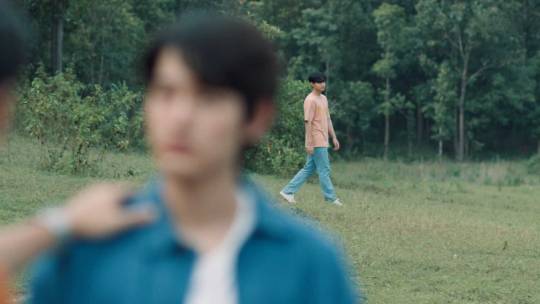
But since I'm a BL girlie, who loves a well-crafted sex scene, I also have to include both of Phee and Jin's high-heat moments when Phee's trying to seduce him on the balcony and when they have rough sex in Jin's room. I'm not gonna lie: That was some king shit on Ta's end.
Best quote: "No one could leave this abandoned house — not even one." Come on! It foretold the surreal ending and fulfilled the victim's wishes. Gold.
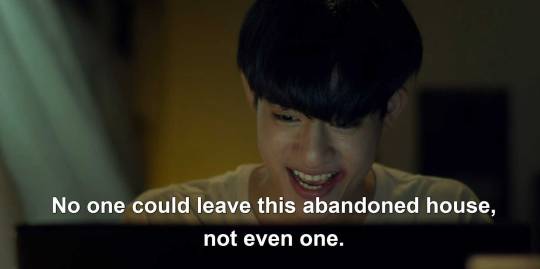
What aged the best? The way that even the bullies perceived teacher Keng as a groomer, who took advantage of a desperate child — that will most definitely make that subplot still bearable even a decade from now.
What's aged the worst? The unaliving and SA montage in the finale that some have said was insensitive/irresponsible to have included. It was like trigger after trigger after trigger — practically a machine gun of traumatic scenes. The fandom could sincerely organize a class action lawsuit against the writer and director for them to pay for our therapy bills.
Scene-stealing location: The lake. Such a beautiful setting for romance, betrayal, and revenge. 😈
Best shot: Definitely the one of Tan from above when he's successfully drugged all of his victims. Iconic.
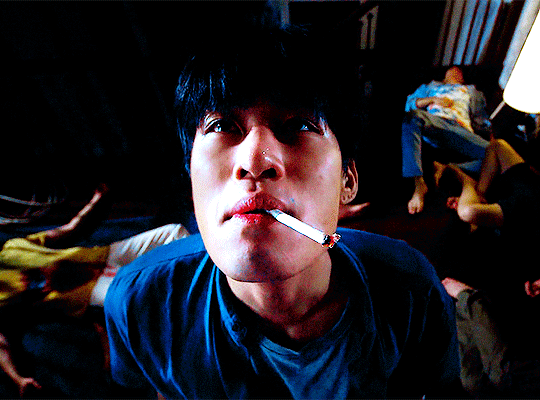
Are we sure this person is good at their job? Tee's uncle. The fact that he has so much riding on two teenagers is ridiculous. He didn't just start being a con man / mob boss that week. How does he not have a more stable criminal infrastructure at this point?
Best use of food and drink: Obviously, Tan spiking the beverages, knowing it would be the easiest way to poison everyone.
Was there a better title? Absolutely not. The play on the phrase "Best Friends Forever," an archaic term popularized in the '90s that puts way too much pressure on kids to find their kindred spirit and hold on to them through adolescence and adulthood, was inspired. It truly encompassed the impossibility of it all. There are just so many obstacles ahead of you, like peer pressure, family obligations, love triangles, bullying, ego, insecurity, and cowardice, that it's a lofty promise to make when you've barely finished puberty. Plus, it kind of hints at the ending...
Overacting award: Some could argue Barcode, but part of his performance was meant to be surreal, because it was in the dream state. I, personally, vote Jet (Top). Sometimes I felt like his character was in an entirely different, far more slapstick genre.
The "That Guy" Award: This category is for the actor/famous person you see all the time, but don't know the name of. I noticed a lot of people were excited to see Perth, so I "saw him all the time" on my feed. When I Googled him, that's when I learned that he was on a reality show with other Be On Cloud stars.
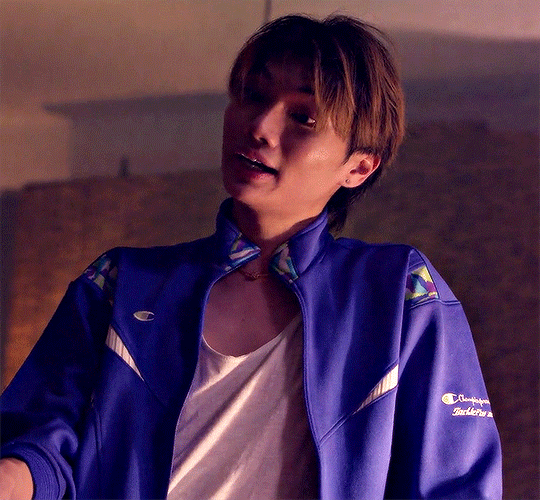
Scene-Stealer (with very few scenes): Honestly, whichever extra/stunt double they had wearing that mask, freaking us out. The most memorable of which was when its creepy hand groped Tee.
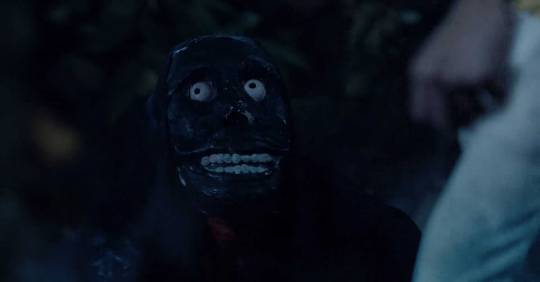
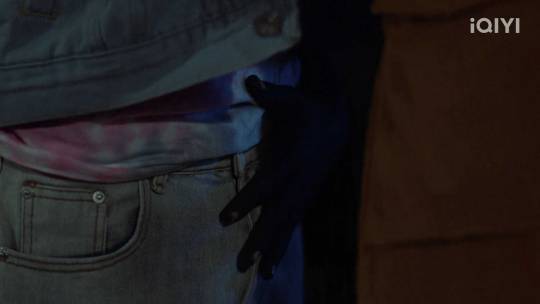
Recasting couch:
I think Nanon (Bad Buddy) could've been interesting as the tormented Tan, because we would've bought his innocence longer.
It could've added to the mystery if we had the BL twins, AJ and JJ, confuse the narrative.
I would watch Neo in almost anything at this point, and he could've played the morally conflicted Tee as he showcased those skills already in Only Friends.
A younger Mark (Last Twilight) would've fit so well into this cast. He plays lost and guilty quite well.
Picking Nits: This category is for pointing out things that just don't add up.
Why didn't Phee's cop dad have more questions about his son's behavior and activities after he saw who his son was involved with?
What teenager is fine going somewhere that has no wifi or reception? Even I wouldn't do that and I've had wifi as long as these characters have been alive.
Why was Non, a teenager, being medicated for mental health issues, but not being monitored by a mental health professional?
If Tee's uncle didn't want to be at a loss if Non died unexpectedly, then why didn't he let him get his wounds treated and get some rest? Unless the plan was always to harvest his organs, which would still have merited rest. Nobody wants shitty organs.
Unanswerable Questions
If Jin and Phee survived, would they have got back together?
If Non were alive, would Phee have ditched Jin?
What did they do with Non's body?
And, of course, after succeeding: Does Tan recover from his grief and move on with his life? Does he successfully escape arrest? Does he leave behind evidence of what the boys did to his family to further persecute them in death? Is his revenge plot really over...?
That was fun! Tag me if you answer the same Qs.
29 notes
·
View notes
Text
a Bridge Season?
Thinking about season 3, folks. And the more I ponder it, the more I am utterly befuddled by the idea that season 2 is a bridge season.
Because if someone says "Yeah, we had a sequel planned for the book- but we need a bridge season to get to that starting place for the series." You anticipate that the setup for the sequel was all in the book, but some crucial bits of that setup were cut for TV. You think, ok, so this bridge season- season 2- will mostly be highlighting things that were in the book which were cut from season 1, combined with things that might have ended up in the prologue of book 2, with some fun extra bits for the sake of a coherent narrative.
There was a lot of "fun extra bits," but for the most part? That's. Not what season 2 was.
Season two was a lot of things- I like to describe it as a love letter, to the fandom, to Terry, to all the people involved in making the show- but it's hardly any of the things I listed above. There's some touching on book-things left out of the show, I can't think of any good examples now, but a lot of it is new!
And those new things made waves, that's absolutely sure! Season 3 will start from a very different place than season 1 ended. Aziraphale's in heaven. Crowley's a mess. Gabriel and Beelzebub are a thing. Muriel's running the bookshop.
But none of those could POSSIBLY have been crucial for season 3 to work.
It would have been pretty wild for 668: The Neighbor of the Beast (the proposed title of the book sequel) to have begun with Aziraphale suddenly in the position of Supreme Archangel. Even if they had a little explanation in the early chapters, it would have been weird- in the first book, there's very little in terms of heavenly politics. It would've been equally weird to have Crowley a mess over their off-page breakup. If that was why season 2 was necessary, Book Omens would've needed a bridge too!
Additionally, from what we know of the planned book, Crowley and Aziraphale were originally planned to work together- I lost the post where this was summarized so long ago, but I vaguely remember mention of them road-tripping across America, which will have to be changed now.
So their whole fight- the consequences of the final fifteen? We can assume that was all Gaiman.
Gabriel was practically a footnote in the book, so it would be wild for his and Beelzebub's absence to be fundamental to season 3- and we know Neil got the idea to canonize ineffable bureaucracy after season 1 was put out.
Maggie and Nina were involved because Neil wanted Maggie and Nina on the set (he's said that too). (I could find sources for all of these things if I went looking, but I'm very tired right now.)
Saraqael was added.
Muriel morphed out of a character Neil said was originally Aziraphale's replacement on Earth, but who he made nice because he was sick of writing about mean angels- so, Muriel could be fulfilling a season 3 role set up for that heaven's-replacement character he mentioned- but they probably weren't at the center of the plot, if Neil and Terry had left the character mostly unplanned.
The flashbacks are either follow-ups to flashbacks introduced in season 1 (1941, for instance), unlikely to be relevant (the Resurrectionists) or very unlikely to contain key plot details (the Job minisode, which was written by John Finnemore without much input from Neil at all).
So what was introduced in Season 2 that makes a transition from book-sequel to show-sequel smoother? Dear Reader, I have no idea. I am not a particularly good theorist, just someone who is pretty sure none of these words [this season] was in the bible [original book].
I just keep coming back to the thought that if the start of season 3 was also the planned start of 668 (and we know it won't be), they would've written a trilogy. Because they would have needed a bridge there, too.
I don't doubt that season 2 was necessary to bridge the gap- and I love it, even if it wasn't necessary, I love it and if Neil wants it back he can pry it from my cold dead hands- I'm sure it was, in some way that we have no way of understanding yet. It must all be in his authorial, ineffable plan, because that's where I am with this, I GUESS. But when he says this was a bridge season to something he and Terry had planned out before season 1 ever aired, I'm clueless.
#if someone sees something I don't please. tell me#i'm out here asking questions that I don't know the answer to#just like a certain#just like-#you know#good omens#Cheshi squeaks#good omens s2#good omens meta#good omens s3#gos3 speculation#ineffable fandom#good omens s3 speculation#Neil gaiman
12 notes
·
View notes
Text
Something I keep seeing when I speak to others about MTMTE Megatron is basically the idea that he's going on a personal journey to become a better person, that the point isn't for him to be "redeemed" but for him to get a chance to do good and die as a person he can live with again. That MTMTE presents a unique take on this because being away from Cybertron gives Megatron a chance to be a person rather than a political figure and this is how it gives him more depth as a character. Or just generally pointing out in a narrative sense that Megatron being in MTMTE limits his story options so of course his story is going to be more focused on a personal journey than on politics of him dealing with the Decepticons/Earth/etc and that just because JRO made a choice to take that path with Megatron doesn't mean that it's inherently bad.
And I'm just, mmm like I understand all of those points and acknowledge that they all contributed to the MTMTE Megatron we got. I even think that without JRO writing Megatron we wouldn't have had his lore be as fleshed out and 3D as it ended up becoming.
(Post starts out as a sort of meta analysis or at least me giving a reasoned explanation for my interpretation of the story, ends up being petty bitching in the last 1-2 paragraphs)
I just..... I just personally don't agree with the "he's becoming a better person by getting a chance to relax and experience happiness and trust after a life of trauma" as being the best choice for his character? Because the problem is that maybe if he were a random Decepticon foot soldier that would be appropriate, but he was literally the leader of the Decepticons that made them Like That and has political/cultural/societal responsibility for why things are the way they are? To be completely frank, I don't care about him going on a personal journey for self-peace, I think that he should become a better person by helping to un-fuck all the things he actually screwed up???
Like idc about the debate of whether he can be "redeemed" or if he should've been killed/imprisoned/etc at the ending. It just comes down to the fact that for me personally, I feel that since Megatron's wrongdoings were at a social level, him "being a better person" would've been better shown by him engaging with those people who he wronged instead of just going on a frigging personal journey for his legacy and self-peace???
Especially since in other series (exRID, possibly Windblade) we literally got plots like "the neutrals hate Autobots but they hate Decepticons even more" and "the Decepticons have been taken over by Galvatron and are now invading earth 2 electric boogaloo" and "yeah the Decepticons are literally living in slums because people hate them so much and won't give them any work." It just leaves me wondering why in the hell people are like, "oh Megatron got to be happy and have a chance to be a normal person." I don't want him to be normal! I want him to repay his debts to the people he actually wronged! Like if you want to cast Megatron as a hero of the people so badly (which so many of his stans do as if he actually cared about the Cons) then how do you reconcile the fact that Megatron just fucked off and left the Decepticons to suffer on Cybertron? Including some of them attacking during his trial and getting killed and Megatron is basically like "sorry, I'm not coming with you and this isn't going to work." And then Megatron complains about "toxic Decepticon loyalty" as if he didn't literally make them that way? Like I get that MTMTE Megatron is still an asshole but if you've read something besides MTMTE and know what the Decepticons are going through, it just ends up being really grating.
I just don't see Megatron as being a particularly good hero or having a particularly fulfilling story if he's completely isolated from all the bad things he did on Cybertron/the way the Decepticons are suffering until LL#25 where it's like "ah damn I'm going to trial now, well this is what I deserve so it's fine." Why could we not have seen something like Megatron trying to deradicalize the Decepticons or change their public image so they could integrate into normal Cybertron again? They were living in SLUMS and getting gunned down by Starscream's badgeless enforcers!
The best we got was the Functionist Universe but like.... I'm sorry, but JRO inventing a whole alternate universe for Megatron to save doesn't do jack shit to save or fix the people he left behind in this one. It was especially grating to read because JRO literally wrote in someone saying "you saved billions of lives from the Functionists" as if he was trying really hard to show how good Megatron is because he saved people (and also if not for Megatron existing Cybertron would be even worse and half of your faves would be enslaved or dead, also the Functionist Council was going to genocide organics too so technically they're WORSE than Megatron since they hate organics AND want to enslave their own race).
I read Barber's, JRO's, and MScott's series concurrently using the omnibus + a release order list for phase 3, and after all that I'm kind of puzzled why the fandom seems to ardently love MTMTE Megatron and think he's so well written but then also shit on Optimus for things that he did during the same points in the story? Because, and I know this is a blazing hot take, I honestly think that Optimus makes a better hero of his story than Megatron does for his, and Optimus' personal journey combines his personal and political identities into a narrative that's a lot more gruelling and questioning of his goodness than we got for Megatron in MTMTE. Which is fucking saying something considering Megatron committed crimes against sapient species and Optimus is the guy who tried to stop him from doing that and has always been pro-equal rights for all beings. But people pretty much just cherrypick things like Optimus annexing Earth or beating up Prowl and go "he's bad" and I'm like no??? IDW OP isn't a bad person or a bad character??? It's just that unlike MTMTE Megatron he's placed in a narrative that actually suits the nature of his actions and has themes that match. To the point that IMO sometimes Barber's narrative shits on Optimus excessively or paints him mainly in the most unflattering ways.
But like. It's just funny to me because Optimus spent his entire part of the story doing things like trying to stop Earth from being invaded/colonized yet again. Grappling with his identity as Prime and dealing with the fact that people literally worship him vs. the fact that his upbringing made him see the Primacy as nothing more than a facade of authority/leadership. Having people get mad at him for prioritizing politics over friendship/relationships with other people. Even getting shit on for being a cop a decent amount so people can STFU about IDW OP being "copaganda" or "not held responsible for his actions". The problems that Optimus dealt with were personal because they had to do with his self-doubt, culpability for the war as a leader of one of the armies, distance from his soldiers, etc. But all of these are also POLITICAL struggles. Because Optimus gave up on the chance to just be a normal person having personal struggles when he chose to become a LEADER, which also means that he's held to extremely high standards that he regularly fails at in the eyes of others.
That's why, to me, MTMTE Megatron falls flat in comparison and really as a "hero" or heel-face character in general? Because he also made a decision to be a leader, and IMO once you do things like become the commander of an army and start your own galactic empire, you lose the right to prioritize your personal problems and instead are obligated by the power you've chosen to wield to focus on your POLITICAL problems. If Megatron's power, influence, and crimes are of a social-political nature, then his heel-face turn arc and ways of showing that he's a better person/helping to heal what little damage he possibly can should have been shown with actions that help on a social-political LEVEL. That's why I'm not particularly impressed with his character arc and feel as if it was overhyped by other people in this fandom: sure, the extra character depth and emotion is nice, but I'm not really going to see him as extraordinary or even particularly good when the extent of him "becoming a better person" happens entirely on a random road trip to fuck-off nowhere. Especially not when the ending of LL tried to sell me a "they lived happily ever after" ending while basically leaving the freaking MUTINY as just Rodimus going "oh it's okay you're forgiven, we're all together again" and I guess everyone was fine with Megatron and wanted to spend an eternity on a ship with him just because Getaway died.
This is why I like (the concept/themes of) exRID/OP and the way Optimus' character arc was handled a lot more. Because for Optimus, the personal and the political were as one. He was held accountable for his actions towards others and the disruptive effects they had on a social level, sometimes to a ridiculous extent (the fucking "oh Megatron is an Autobot so now that makes the Autobots colonizers" plot and that stupid colonist screaming about how Optimus is "literally fascist" my beloathed). Even his very personal issues like his relationship with Zeta were still cast in a wider lens of, yeah this is a personal struggle that Orion faced, but he was still part of a Society TM and his actions were sometimes ill-informed or harmful to others. Even if I had a lot of problems with the way Optimus' story was written by Barber (plot holes, little meaningful character interaction, forced conflicts), at least the BASELINE of it was way better than Megatron's in MTMTE. Especially since Optimus' struggle was explictly about things like struggling with responsibility and how he feels he HAS to intervene in political affairs because has to save people/make up for his past mistakes. That's something that a good leader/good person actually does, so I found Optimus to be a better hero (even if his actions weren't all "good") because he was trying to be a good person by actually getting involved with Cybertron/Earth and subjecting himself to something he hates (leadership, war) and dealing with a shitload of criticism instead of just going on a fuckin "personal journey" lksdlkfsd.
Which just makes me extra salty that people hold up MTMTE Megatron as the pinnacle of Megatrons and literally the best Transformers writing evar! while turning up their nose and ignoring or outright despising IDW Optimus. Like okay. I guess since Megatron got handled with silk gloves on while Optimus got put through the wringer of being shit on by every other person in the story, it's easier for you to pretend that Megatron is a poor uwu boy who just needs friendship and love while Optimus is literally the worst bastard to ever exist. Or maybe it's just that since Optimus' story involves him sometimes fucking up, being criticized, or making things worse, that makes him morally bad. As opposed to Megatron who disrupted a lot of other characters' stories in MTMTE, had to have an entire alternate universe invented so that he could "save lives," and got to sail off on a quantum Lost Light happily ever after, so since he's happy and the story says he saved people that means he's a good hero.
#squiggposting#it started out sort of analytical but ended up bitchy#i also feel like for some reason my understanding of what a redemption arc is is different from others?#when i talk to people about it they keep saying 'well M can't make up for what he did'#and i'm like. no that's not what i mean by redemption arc#to me redemption arc literally just means 'a character goes from bad to good over the course of a story'#whether they're forgiven or if they can 'make up for it' objectively is irrelevant like#redemption arc is literally a common label used for the general trope so idk where this confusion is coming from?#also hot take when i say a character should be redeemed i'm literally not talking about wether they're forgiven or pardoned in universe#i just mean. as a reader. do i read their story arc and see them go from bad to good and progress in meaningful ways#do they do something. anything. to address or apologize or fix what they did#is there some sort of symbolic or literal sacrifice or act of service or any Good Thing even if it's only one single moment#then to me they've been redeemed in a narrative sense. it has nothing to do with whether they can literally compensate for hteir crimes#anyways. the tldr of this is that i don't hate mt/mte at all and i also don't hate idw M. i love them in fact#it's just i feel like i was severely let down by how much this fandom hyped and continues to hype mt/mte meg#(peg/gy the pirate spongebob meme voice) that's it? that's the M redemption arc?#that's just a guy going on a space road trip and being emo#mfs tried to tell me it was one of the best tf stories ever written and i'm like. yeah thanks but no#worse still ppl came out of m/tmte going 'actually M was right about everything'#and i'm like. shit take and you are spreading this nonsense everywhere including shitting on my faves w your bad takes#mfs wanna call M a hero of the ppl who at least cared about the cons when he literally left them for broke on cybertron#i don't think idw M had a good heel-face turn arc bc he didn't really like do anything meaningful in the wider scope of things#what if idw M achieved inner peace by protecting the cons and making sure they had rights post war. how about that#i mean for various reasons the story would've been more complicated than that due to editorial and company mandate bullshit#i just feel as if talking about the story narrative itself IDW M's redemption arc is far from remarkable#except for the fact that JRO dared to do it at all perhaps#(vine voice) that's my OPINION!!!!!
19 notes
·
View notes
Text
Meiko is (indirectly) responsible for Rosemon and Hououmon/Phoenixmon appearing in tri.
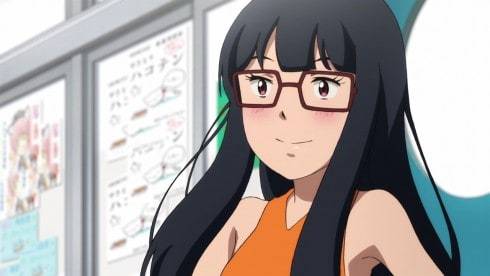

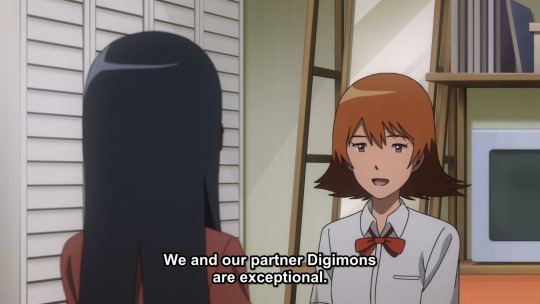

If you really think about it, the scenes in which Meiko cheers Mimi up by wearing the Daters cheerleader outfit in part 2 of tri and the scene where Meiko repeats the words Sora taught her in part 3 back to her in part 4 are both pretty big important scenes for Mimi and Sora's character arcs in tri since both scenes involve Meiko being supportive to the girls that causes major changes in attitude that lead to them fulfilling the evolution/digivolution prophecy thus making Meiko indirectly responsible for Rosemon (partially since Jo indirectly contributed as well but for different reasons but this rant is mostly about Meiko) and Hououmon/Phoenixmon appearing in tri.
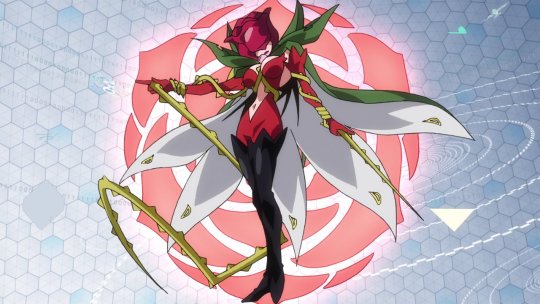
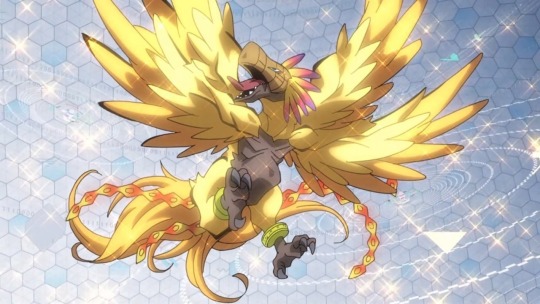
Keep in mind that these scenes aren't just minor bits of filler that only exist to pad out run time, they are major important scenes for Sora and Mimi's characters in tri so cutting them out changes way more of the plot than you'd think. There are 2 criticisms I've seen towards Meiko that I feel are rather flawed (they're not the only flawed criticisms towards Meiko and by extension tri but I'm only going to focus on these 2 critiques and why I can't bring myself to agree with either of them no matter how much time passes) is that Meiko "does nothing" (even though contributing to other characters development is still technically contributing to the story in some way) and that when you do bring up the scenes where Meiko is supporting Sora and Mimi those same people would usually move the goalpost by claiming that those scenes don't count by claiming that "other characters could've done the same thing" (which kinda contradicts the first criticism towards Meiko if you really think about it since that critique rellies on admitting that Meiko did contribute to the story in some way). The reason I feel the latter critique doesn't work is because it rellies too much on whether other characters could have filled the same roles in those scenes and no where near enough on whether those other characters would've been just as if not more narratively effective to use for those scenes than Meiko.

Especially when you take how much screentime in part 2 is dedicated to Mimi and Meiko's friendship which I think is part of the reason why Meiko wearing the outfit was as effective as it was. Another reason why I feel that scene in particular worked was that Meiko was a new character (at the time, the first part of tri is nearly a decade old as of making this rant... god I feel old) who hasn't been friends with Mimi anywhere near as long as Sora and Hikari/Kari have been since Sora and/or Hikari/Kari wearing the outfits, while it still probably could've worked probably wouldn't be as narratively effective since both have been friends with Mimi for years whereas Meiko' being's social awkwardness and modesty is meant to showcase her breaking out of her shell because of Mimi... for the most part, she still acts rather shy while wearing it but it's still meant to showcase how much Mimi's friendship means to her anyways since I doubt Sora would be anywhere near as embarrassed wearing said outfit.

There's also the fact that Hikari/Kari already had a big scene near the end of part 2 of tri of her helping Jo with his struggles of his reason for fighting (since at that point in tri he was struggling with his grades and felt that if he focused on fighting that would mean throwing his chances of becoming a doctor away while at the same time feeling that he's a coward for having this struggle in the first place since it put his and Gomamon's relationship at risk and some other stuff) and since the scene where Meiko cheers Mimi up and the scene where Hikari/Kari helps Jo out are so close to each other it probably would've been weird to have 2 scenes of Hikari/Kari having big moments of supporting other characters so close to each other.

Jo/Joe already had that scene early...ish in part 2 and like I said earlier had his own character arc with Gomamon so it'd be a little weird for him to be the one to wear the cheerleader outfit (not that he'd look bad in it I'm sure he would've slayed in the outfit but this is more about how he probably isn't the best choice for that scene narratively). Taichi/Tai, Yamato/Matt and Takeru/TK barely have any screentime with Mimi in part 1 and 2 of tri so they probably wouldn't be very good choices for that scene. And Koushiro/Izzy already had a crush on Mimi that was played for comedic effect so a scene with him and Mimi probably wouldn't be that narratively effective and there's his arc in part 3 (as well as the fact that much like the other main characters, he's been friends with Mimi for years and I've already gone over why someone like Meiko who hasn't been friends with Mimi for that long was more narratively effective). Sometimes when it comes to critiquing a character's role in a story it's less about if other characters could've done the same thing and more about if using said character is the most narratively effective choice. There's also the fact that since Meiko plays a more non action supporting role (which would've only been sexist if Meiko was the only major female character in tri but since Sora, Mimi and Hikari/Kari already play the role of action girls who help out and contribute to fight scenes means I highly doubt one supporting character hurts) means that it was kind of necessary to give Meiko scenes like these especially when you take into consideration that her partner Meicoomon is the source of the infection and technically one of the main antagonists in tri.

There's also the fact that we know the 02 epilogue is still canon and that we know all of the main protagonists from the first 2 seasons make it out okay so new characters like Maki, Daigo, Meiko and Meicoomon being created for tri was kind of necessary to prevent tri from being way too predictable since we know they're going to survive anyways (which is fine for something more minor like those Last Evolution: Kizuna shorts but probably not for something more major like tri or the post tri movies), something that Last Evolution: Kizuna and 02: The Beginning also did by creating new characters for basically the same reason as tri.
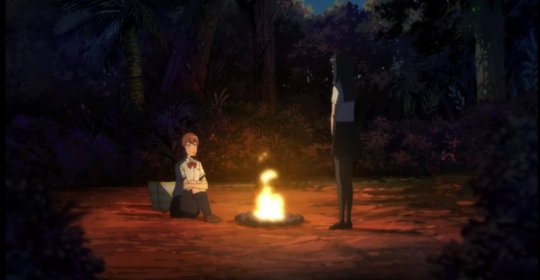
As for Meiko repeating the words Sora taught her in part 3 back to her in part 4, much like the cheerleader outfit scene it's not just meant to showcase Meiko contributing to Sora's arc that leads to a big change in attitude that leads to her reconciling with Piyomon/Biyomon (well that and being attacked by the Mysterious Man/Dark Gennai and Mugendramon/Machinedramon) but it's also meant to showcase Meiko learning from Sora in those scenes showcasing she took what Sora said to heart. A lot of the points I said about the Daters outfit scene with Mimi and Meiko can also be applied to this scene with Sora and Meiko so I probably won't be going into as much detail but I'll try anyways. Sora spends a surprisingly much larger amount of screentime with Meiko in tri than you'd think but she also surprisingly barely had any screentime with Takeru/TK in tri up to this point so he probably wouldn't be good substitute as well as the fact that he and Koushiro/Izzy already had an entire OVA mostly focused on them. And again much like the scene with Mimi and Meiko in part 2 I feel part of the reason this scene works as well as it does is because Meiko is someone Sora hasn't been friends with anywhere near as long as someone like Taichi/Tai, Yamato/Matt, Mimi, Jo or Hikari/Kari since those are people Sora (and the audience probably) probably would've been way more expected to try to cheer her up since she's known them for way longer... depending on who you'd ask (this part is honestly noticeably more subjective than the other points for an already subjective rant).
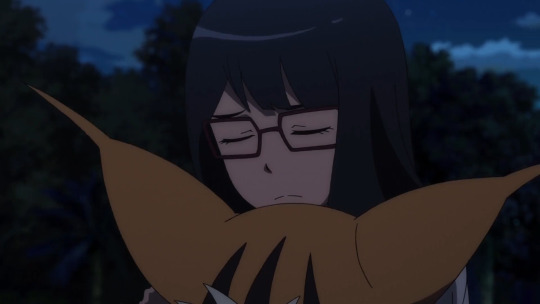
At this point in tri it's also just in character of Meiko to be supportive of others and this is meant to lead into the scene where Meiko reunites with Meicoomon taking those words Sora said to heart by admitting it was wrong of her not to go with the others to the Digital World (that she did because she felt she didn't deserve to see Meicoomon due to feeling responsible for all of the other partner digimon getting infected and couldn't tell the others for the same reason Takeru/TK couldn't tell the others about Patamon being infected).
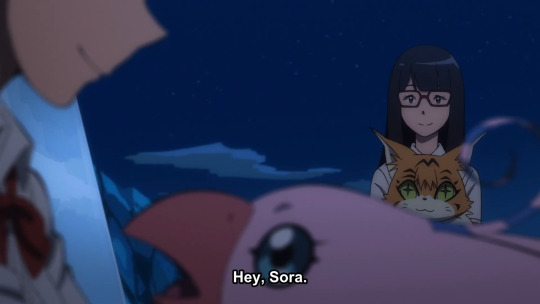
The scene is also most likely meant to parallel Sora and Piyomon/Biyomon's reconciliation later in part 4 (Anyone else really thankful Piyomon/Biyomon's statement about wanting to try Sora's meatballs in tri was written with sincerity like the sea salt ice creams in Kingdom Hearts and not irony poisoned like hell like a Joss Whedon script... screw that creep). It probably wouldn't work as well if you used Taichi/Tai and Agumon, Yamato/Matt and Gabumon, Mimi and Palmon etc. for these moments for the reasons I already listed given and I'm already running out of things to say about this unnecessarily long rant. I guess wishing Meiko contributed more is a reasonable complaint but don't try to move the goalpost when someone brings these scenes up since you'd be kind of contradicting your wish (these aren't even the only scenes where she contributes like how her wish to put Meicoomon out of her misery near the end of part 5 was one of the most important decisions in tri that lead to the other main characters following along with that decision and how it lead to them realising that they can't save everyone but this also isn't that important to this rant). I probably could've worded some things better or come up with better reasons but hopefully people understand where I'm coming from. Or you could use this as shipping fuel and reasons to like the Mimi x Meiko, Sora x Meiko and/or Sora x Mimi x Meiko ships more I don't mind (in fact I encourage it).
#digimon#digimon adventure tri#digimon tri#digimon adventure#meiko mochizuki#meimei#mimi tachikawa#sora takenouchi#rosemon#hououmon#phoenixmon#digimon rant
8 notes
·
View notes
Note
hi! I just wanted to share my 2 cents about your aerith post and her screen time bc after I finished the game I shared the same sentiment, but after 2 weeks of thinking, rewatching and analysing cut scenes (this game lives rent free in my head now), I realized why they pace her arc the way they did. basically her arc deals with her duty as cetra and coming to terms w/ it. however there wouldn't be any progression if she was already resolved to do it, hence at the beginning of rebirth we have aerith who is happy to start her adventure w/ her new friends (the one she wanted to go w/ her mom as we learn from her trial, so her moment of joy after leaving kalm feels even more deep). but as we continue we can see the mix of inner struggles that resides in her: being last cetra, trying to moving on from zack and dealing w/ dark thoughts about hojo. her Costa del Sol scene suggests that she'll learn how to deal w/ all of that and she believes it'll make her a better person in the future (in some way it has come true bc aerith sacrifices her life and any chance to spend it w/ ppl she loves, and of all things she wanted exactly this). despite that it doesn't cancel her desire to have a normal life and enjoy every moment while she can (in the same Costa del Sol ch. where everyone leaves the beach you can see aerith lingering and watching the sunset as she tries to take it all in for the last time). I think starting from Cosmo canyon her resolve comes into form bc she admits about the loneliness she had to face. At the temple she's willing to learn how to control lifestream (even tho you can see moments when she's upset when it doesn't work out). and at the end she's resolved to fulfill her duty not bc she's a cetra but bc of her friends.
This way you learn to care about her as a person and not just her role as a chosen one. also it's just my personal impression that the devs didn't want her to be a walking sign of death to preserve that feeling of her loss. instead they tease the player the idea of saving her to via marlene, red xiii and partially zack scenes (which feels even more cruel imho).
i can definitely appreciate your perspective!! to clarify i didn't want her to be fully formed in her identity and duty as a cetra at the beginning of the game, and this sort of arc about her learning to explore that side of herself more was in fact exactly what i wanted, i just feel the game doesn't really address it as much as i wish it did. like besides the cosmo canyon fire scene and the last couple chapters there's not a lot there and you're left to infer a little too much imo. i would've liked to see aerith voice her feelings about it to someone more so that we could get inside her head about it. nanaki would've been great since he has a similar connection to the planet/responsibility to uphold the legacy of his people, or tifa since she and aerith confide so much in each other already. or even cloud! that could've brought more attention to their relationship in the narrative so it wasn't so sparse.
i do get that they don't want it to be obvious she'll die for new players but by the same token i sort of feel like if they were that concerned about that they wouldn't have had marlene straight up say sephiroth is gonna kill her. by and large this game's story feels targeted at a primary audience of people who've already played ff7 so i don't know that i feel that's a good enough justification not to explore all the facets of her character in more depth while they could.
that being said i absolutely agree that i love her arc about her connection to the party and how she clearly struggles with but ultimately is able to accept her fate because of how much she loves them and how much they brought to her life. i thought that was really beautiful and heartfelt. and for all my griping i did sob over the ending so it's not like these critiques i have ruined the emotional impact overall!
2 notes
·
View notes
Note
Went through your fic tag and saw that you may possibly write a Paul dies instead role reversal AU? It’s interesting because it’s not something I’ve seen really explored in fic. I mean, I think I read 1 in the JHP days and i couldn’t make it through because it was just too much, like the tone was very ~anime~ sort of like how a great deal of the ‘Paul in pain’ fics are on ao3. But you’re a great writer so your take on that would be interesting. What are your thoughts on the subject anyway? I know a lot of people think John would just give up on life but that’s always felt completely unfair to him. Although I do think his grief would look very different from Paul’s but no more or less deep than his.
Hi anon! Thank you for your kind words about my writing :)
I don't wanna give too much away about that story, especially when I've not written anything for it yet.
I can't really say for certain how it would've impacted John but here's some thoughts:
I definitely don't think he would've taken it well at all and I think he was in a generally worse place than Paul in 1980, including the fact he probably suffered from a quite severe depression.
His incessant apparent mentions of Paul in his diary lend credence to the idea he was still in some sense obsessed with him by December 8, so I do think it would take a great toll on his mental health – both as a tragedy in of itself, but also as a culmination of the many deaths he had already experienced.
One important part of the story I plan to tell is how this would impact Paul's as well as John's individual reputations. The question of handling a legacy – as we've been able to watch Paul do in our timeline – is somewhat central. This is also where Linda, who would be in charge of Paul's estate, comes into play: what narrative would she choose for her late husband and how does it impact John's image? And how does John feel about all this privately? How does Linda feel about John's reaction?
My take is certainly rather bleak but I think I know what you mean when you talk about an ~anime~ tone, and hope my story wouldn't be like that. It'll be dark, I think, but John won't be a solely passive actor wallowing – though wallowing will be a part of it, since it is John we're talking about. I also have little interest in writing fics with absolutely tragic endings (and also have little interest in wish-fulfillment stories for that matter) so it would definitely not be a pure exercise in misery.
Also, the planned structure is that it will be about 5 chapters all taking place on the same date, with one to two year time jumps in between, which I think is good because it cuts out a lot of the motionless sadness that might accompany an especially painful grieving period.
#also i will 100% write it btw#like i am IN LOVE with the story i just havent started because i NEED to finish ILTY first#ask#anon#fic
6 notes
·
View notes
Text
Waiting For Forever Sequel Fanfic Musings & Questions
So, I am trying to write the first ever Waiting For Forever, a 2010/2011 Tom Sturridge film, fanfic and it is proving harder than I first thought.
I have a few things I could do with the story, but the either or's that I have would change the narrative a wee bit.
Honestly, I want to write a decent story that I could eventually get made into a hardback leather bound book that I would then gift to Tom himself as a present as a thank you for playing such a wonderful character that I wanted to explore Willie myself in a sequel story. The idea is of course to touch Tom's heart and move him to tears.
But I have a few 'either or' questions to pose to the audience that would change the direction of the story, or maybe more of the history of the story.
Things I know for sure:
My OC is named Julia, or Jules for short. Jules is Dolores' little sister. Willie met Dolores and Jules in MA when him and Jim moved there after their parents died. Willie introduced Joey and Dolores, who of course later got married and had a kid.
1.
EITHER:
Emma gets the letter from Willie, but she never seeks him out. The last part of the film is in Willie's head as his hope and fantasy. This would mean that the last time Emma and Will spoke would be when she told him not to follow her anymore. Will would have likely heard that Emma spoke to Joey and spoke to his brother Jim, but she chose to never see or speak to Will again. This could be either a help or a hinderance to his healing process as that last conversation with Emma was traumatic for Willie. But the letter he sent was a letting her go sort of thing, so, he might have been able to heal from it as well.
What do ya'll think about that?
OR:
Emma still sought Willie out like at the end of the film, but it wasn't her choosing him, but wanting to better understand him. But also to say goodbye as she would be leaving the States. Emma during the film was seemingly searching for something and just wasn't finding it. Maybe once upon a time, Will could have been it, but so much has happened and for Emma to heal, she needs a fresh start.
Willie would be sad but I think he would understand. And that would be the end of a chapter in his life and he could start to heal too because all he wants is Emma to be happy and fulfilled. And if that isn't with him, then he accepts that.
2.
EITHER:
This is a three-parter that will kinda come up again but here it is -
I move up the timeline to be set in modern day 2023/2024. I like using music in my stories and having to stick to music that was out to a certain point in time is a bit meh to me, but if it fucks with people's immersion in the story, then I will set it in the year it would actually take place in the story depending how many years ahead we are going. But yeah, modern day even though the film was set during the time it came out which would've been 2010/2011.
OR:
Like I already mentioned; set it during the time it would actually take place based on how many years have past since the film came out in 2010/2011.
3.
EITHER:
Willie and my OC that I am making for him to fall for will be the same age, therefore probably went to school together the same years, and therefore know one another and have memories, though Willie was blind to my OC's affections cuz of his Emma fixation. If they are the same age, the theme would be "my true love was in front of my eyes the whole time" sort of thing... ya'll have Stardust to thank for that.
OR:
Willie is older than my OC from anywhere between 3 to 7 years. This goes into some of my timeline situation too. But also with inserting myself slightly into my OC, Tom Sturridge is 7 years older than me. So, depending on how many years have past, and if we are set in modern times or not, it will determine if there is an age gap too. If Willie is older, that would save me from making too many past memories between them because of course Willie wouldn't have noticed my OC, she was too young at the time to be noticed.
4.
EITHER:
The story is set five years after the film, which could be in 2015/2016. Willie would be 30/31.
OR:
The story is set in 2023/2024 and is between 12 to 14 years after the film. Willie would be Tom's age, 38, if we say he was Tom's age in 2010/2011, which would make Willie 25/26 in the film.
So, summed up, I need to know if Willie and my OC should be the same age or not? How many years have past for sure; 5 or 12-14? And if I am changing the year of when the film was set if I am setting the sequel story in modern times?
Answering these questions will help my figure out what direction the narrative goes, or at least the history and back story of some things.
There are things I know for sure, but these are some of the things I need help determining. People who are interested in reading this story, could you help me decide some of this? It will help me know where it is going narrative-wise. Thank you.
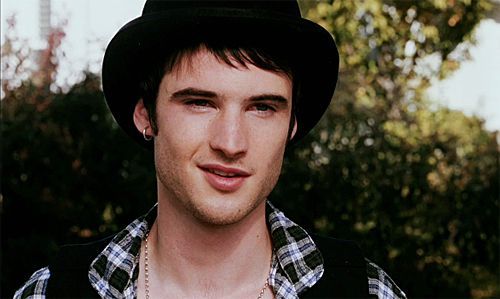
#tom sturridge#tomsturridge#waiting for forever will donner#will donner#waiting for forever#tom sturridge fanfiction#tomstu#thomas sidney jerome sturridge#thomas sturridge#willie pajamas#fanfiction#fanfic#fanfic writing#ao3 fanfic#ao3 fanfiction#help me decide
0 notes
Text
A Think Piece on Love
Love? I've recently begun to read All About Love by Bell Hooks, and it's got me thinking not just about love, but what it's supposed to be. At my young, yet old, age of 20, I've begun to question everything I've previously learned. When I first came to college I thought I had found some convulsed version of love. But that's because that was all I knew, this perverted masculine version of love. A plot in a movie, the first glance from a stranger, or that seemingly perfect couple on Instagram. That's not love, but, growing up with a single mom ,and an absentee father, didn't exactly tell me what love was actually supposed to look like, all I had was fantasy.
Now the real problem with that fantasy, wasn't the existence of it but it's perspective. I had watched my mother my whole childhood, date men who she could care for, yet never seemed to care for her, at least in the ways she needed. She would take pride in the fact she could become exactly what they needed, until she realized she didn't want to. Mirroring my mother, I'd come to find that love for me becomes something I have to earn not that I'm given. So to explain, my recent experience with love, romantic love at least, it's quite simple. I became addicted to trying to prove myself, worthy of a place in someone else's life, which is unfair to not only them, but especially me. To make a long story short, because that's not really what this is about, I loved someone more than they ever even thought about me. Now in society, love is such a strong, and heavy, word it no longer carries the same positive connotation it used to, and I think it's because heartbreak in the 21st century it's hard to truly know what love is, but boy did I think I had it figured out. As to be assumed, it didn't work out, for many reasons, the biggest one being he simply just didn't like me. But, in my own ethnocentric way, it took me so long to fathom why that was.
If I loved, and intensently desired this person so much, why didn't it work out? I know, I'm crazy, but there was this voice in the back of me head, telling me this was my one and only shot at true love, and if I couldn't make him love me, no one ever would, or I wouldn't ever want anyone to be in love again. It was the manifestation of the endless extentil pressure I put on myself, that I couldn't even live up to. The pain of love felt meaningless, and once this voice had become silent, I'd realized that love can't be controlled, more importantly something that can't be rushed. I've always been a quick person, rather impulsive or unmoving, and I found myself impulsively choosing to try and force someone to show up for me.
I found myself having a conflict with two different people, none of them being the person of my interest. Instead, there was one person inside of my telling me to fight to let go, and another telling me something would give. However, the person who was fighting to let go, the person writing this now, and the same person who's decided to look in the mirror. Unbottling all these emotions I had for fear of upsetting other people, or being honest with myself, dismissed a lot of emotions that would've helped me process this, and take myself out of that cycle. Most of all though, I've dismissed a lot of people who I thought were going to break my heart again.
I'm learning to let that go though, this idea what I think love should be, and instead trying to fulfill, and understand, whatever love means to me. I don't have it totally figured out yet, in any capacity. Love for me is unknown, unexplored, but I there's an urge to dive into the vastness of love, to experience all it's quirks and kinks, and work every single one of them out. The impossible, truly, the perfection and longing I feel are only kinks I need to workout within myself, and I've come to discover, I'm the only person I want to save me. I'm challenging the narrative I've given love, and that it has to be picture perfect. I'm rather interested in diving into an ocean of raw and honest truth of love that baptises, and saves me. I'm more interested in the realistic outlook on love that offers me honesty, and not the fantasy that's stuck in my head, however hard that may be to face.
1 note
·
View note
Photo


OCTAVIA BLAKE
The 100 / Season Six / Episode 03 / The Children of Gabriel
#The 100#Octavia Blake#Marie Avgeropoulos#the100edit#there are some people out there who think that it would've been more narratively fulfilling to have Octavia sacrifice herself in the gorge#but I'm not one of those people#seeing her crawl her way out of hell#reclaiming herself and finding her peace will always be more satisfying to me#because too often Redemption Equals Death is used as an easy out for the one doing the redeeming#a convenient way for the character in question to escape judgement#so I'm glad Octavia did it the hard way
316 notes
·
View notes
Text
The Six Realms
Okay, so I was pretty close to giving up on writing analyses but I'm back LMFAO plus I see we're close to 100 followers and I just want to thank you guys for being so very supportive <3
Alright, I'm not sure if anyone's ever written about this, but if an analysis like this exists, please do let me know because I'm kind of curious as to what other people think about this, too!
Remember that time Fukuchi spoke about bringing "about the five signs of an angel's death"?
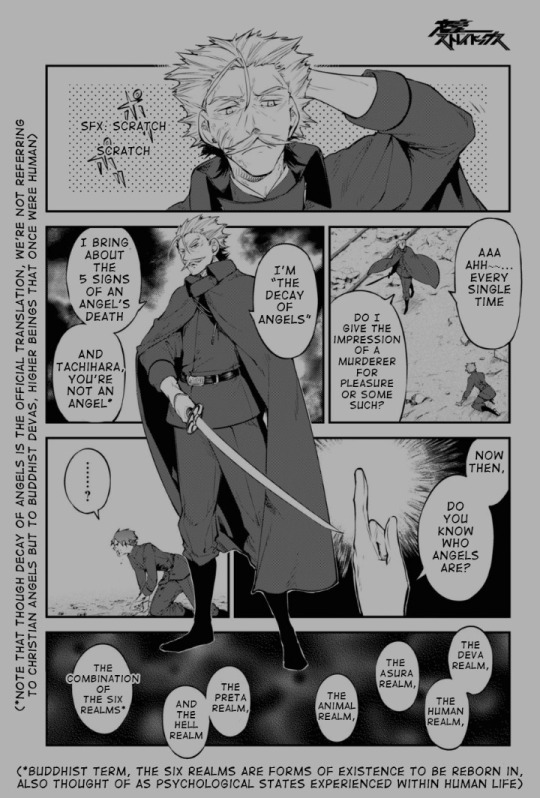
I read a little bit more about it, and as a minor content warning: this analysis will focus on a few religious aspects (Buddhism + Hinduism). So if I get any of the facts wrong, firstly: I do not mean any disrespect to either religion, and secondly: please do correct me if I interpret anything in the wrong way.
Spoilers for BSD chapter 90 onwards + BEAST!AU under the cut!
So I'll start by talking about the Decay of Angels. As we all know, the members include Fyodor Dostoyevsky, Nikolai Gogol, Sigma, and Bram Stoker, and their leader, Fukuchi Ochi. After Fyodor's arrest, the Decay of Angels came into light with Nikolai murdering four government officials in a week. These murders symbolise the Buddhist cycle of existence, or otherwise known as samsara: the cycle of life, death, and rebirth.
"We are the Decay of Angels—hiding here as terrorists, a 'murder association', five people who will announce the demise of the celestial world."
Nikolai Gogol, chapter 57
Samsara is described to be a concept beyond human understanding. According to Hinduism, samsara is the physical world where every being has its soul trapped into a physical vessel. The Hindus believe that everything has a soul, and due to a soul's attachment to desire, it is forced into a deathless cycle of being born, dying, and reincarnating into a different body. In Buddhism, the ultimate way to break free from this cycle is by obtaining nirvana.
Nirvana is a Sanskrit word for the goal of the Buddhist path: enlightenment or awakening. In Pali, the language of some of the earliest Buddhist texts, the word is nibbana; in both languages it means "extinction" (like a lamp or flame) or "cessation." It refers to the extinction of greed, ill will, and delusion in the mind, the three poisons that perpetuate suffering. Nirvana is what the Buddha achieved on the night of his enlightenment: he became completely free from the three poisons. Everything he taught for the rest of his life was aimed at helping others to arrive at that same freedom.
- TRICYCLE'S definition of nirvana
As Fukuchi mentions in the panel above, there are six different realms of existence. These realms represent every possible state of existence, but one cannot live in a specific realm forever. Depending on whether or not one's past actions were morally good or bad, an individual is born into one of these realms. Basically, the controlling factor of which realm a person is born into is dependent on their respective karma. The realms are separated into two categories: the hellish ones and the heavenly ones.
The Deva Realm: where beings are rewarded for the good deeds they have done. This realm is void of anything unpleasant. It is basically paradise— empty of unfulfilled desires, any form of suffering, and fears of every kind. Religious individuals, however, do not seek to be born into this realm since its attitude is more or less carefree.
The Asura Realm: where demigods are admitted. Asuras are driven by greed and envy, and may come in conflict with human beings since they are quite similar. They are powerful beings, but quarrel with each other quite a bit, making this realm quite undesirable to be reborn into.
The Animal Realm: where beings are given the form of an animal (you probably guessed that lol). Individuals here don't actually have good karma to take pride in, but rather, they are born into this realm to work off their bad karma (by being slaughtered, hunted, or forced to work, etc). Being born into this realm forces one to atone for their past sins by living out their life as an animal.
The Hell Realm: where one is punished for their evil actions. The most merciless of realms, where one pays for their transgressions through pure suffering, methods of which include: dismemberment, starvation, and psychological/physical torture. However, once a person's term is fulfilled in this realm, they are presumably promised to be reborn into a higher state.
The Preta Realm: similar to the hell realm, in which beings pay for their past sins (specifically: greed and stinginess) by having to survive through hunger and thirst. This realm is also known as the 'ghost realm,' because some pretas are psychologically tortured by being forced to live in places their past selves have lived in. They are invisible to human beings living at that time, which pushes them to face the depths of despair and loneliness. Your typical horror movie, really.
The Human Realm: the only realm where one's actions determine their future. The status (social ranking, physical wellbeing, and so on) of a human being in this realm is determined by their past actions, but due to the fact that a person has their own conscience to differentiate good morals from bad, the actions they commit in this realm have the power to determine which realm they are sent to next.
Okay, so now that I've got that out of the way, let's shift our focus to the Book. Very little is known about the Book, but the basic fundamentals of how it works is that whatever is written in the book will come into existence only if its contents follow the rules of karma. In addition to that, only a few sentences can be written into a single page of the Book, and it must follow the current narrative of the story.
If I'm not wrong, the first time the Book was mentioned was by Fitzgerald, who wanted it to resurrect his deceased daughter in hopes of restoring his wife's mental health. The next time the Book is brought up is when Fyodor's intentions to possess it are divulged; his goal was to decimate the global population of ability-users. And now, the current arc has the Book as its central focus, with a single page in Fukuchi's possession.
[ BEAST!AU spoilers ]
The Book acts as the central point of multiverses, with each character's lives differing from universe to universe.
Dazai committing suicide in this alternate universe stands in sharp contrast with how he decided to start up a new life in the main universe.
Oda staying alive to act as a mentor to Akutagawa in the ADA differs from how Oda uses his death to prompt Dazai to "be on the side that saves people."
And of course, the way Atsushi and Akutagawa have their positions switched in the two universes depicts how different their lives would be if they were given the chance to be mentored by different people— these are just a few examples of how the Book houses an endless amount of possibilities.
[ end of BEAST!AU spoilers ]
Hypothetically speaking, this kind of reminds me of the differing realms I mentioned before, where suffering is promised in some realms, and better things are granted in the rest, depending on one's karma, or the deeds they've done in their past lives. In this scenario, perhaps one's past life can be understood as one's current life in a different universe. That's just a personal opinion though. Take it as you will.
side note: Keep in mind that the person who is more or less impervious to the Book's effect is Dazai, with his nullification ability. I wouldn't want to propose any theories in this aspect (I don't believe I'm fully fact-checked ;_;), but I could use Dazai as a raw example of how your choices affect your future. If Dazai had decided to stay in the Port Mafia after Oda's death, or if he even decided to go through with his suicidal fixations, life would've been different for him in the root universe (obviously, ryley) I mean, you could basically understand that from how he ended up in the BEAST au, but imagine if he really did slip up in his decision-making in any of the universes.
Many analysts have proposed that he went MIA (early in his life) from the main universe for a while to figure out how the BEAST universe worked, whilst having the Book to his advantage. Perhaps his actions were guided? I'm not saying he's all-knowing, but he's sure as hell smart. I'm not sure if Kafka was trying to highlight the concept of karma when it comes to Dazai, but if he is, then I suppose you could say that Dazai is pretty much unaffected by the rules of karma, existing as the centerpiece of all the multiverses. No Longer Human is the namesake of his ability, but the book talks about disqualification from societal norms and generally, the world. I was talking about it with a friend, and they reminded me that Yozo (the main protagonist) was pretty strong in his views against society. Like he didn't speak out of total defeat, he spoke out of defense. If there was anything Dazai actually lost to, it was his guilt— "Living itself is a source of sin."
Then again, that's my personal interpretation since everyone has their unique perspective of his writings. In terms of the actual adaptation, you could translate the word 'disqualification' to 'insusceptibilty' when if it came to the Book's effects on Dazai? This side note is becoming really long lmao anyways I'll link a few theories which afflicted me with brainrot down below.
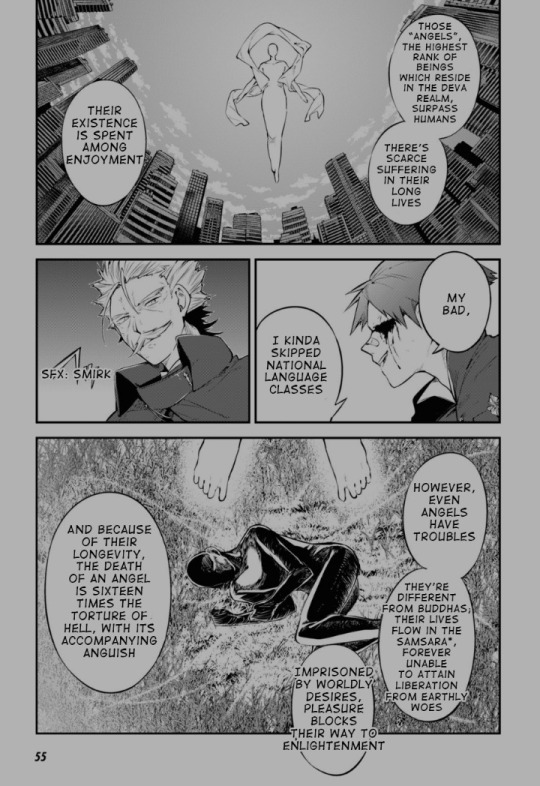
Another thing before I wrap up, the name 'Decay of Angels' stemmed from Yukio Mishima's book entitled 'The Decay of An Angel.' This is the final novel to the author's tetralogy: 'The Sea of Fertility.' The main protagonist, Honda, meets a person he believes to be a reincarnation of his friend, Kiyoaki, who takes the form of a young teenage boy named Tōru. The last novel of this series enhances Mishima's dominant themes of the series as a whole:
the decay of courtly tradition in Japan
the essence and value of Buddhist philosophy and aesthetics
Mishima’s apocalyptic vision of the modern era
Again, this could be referred to what Fukuchi goes on to say:

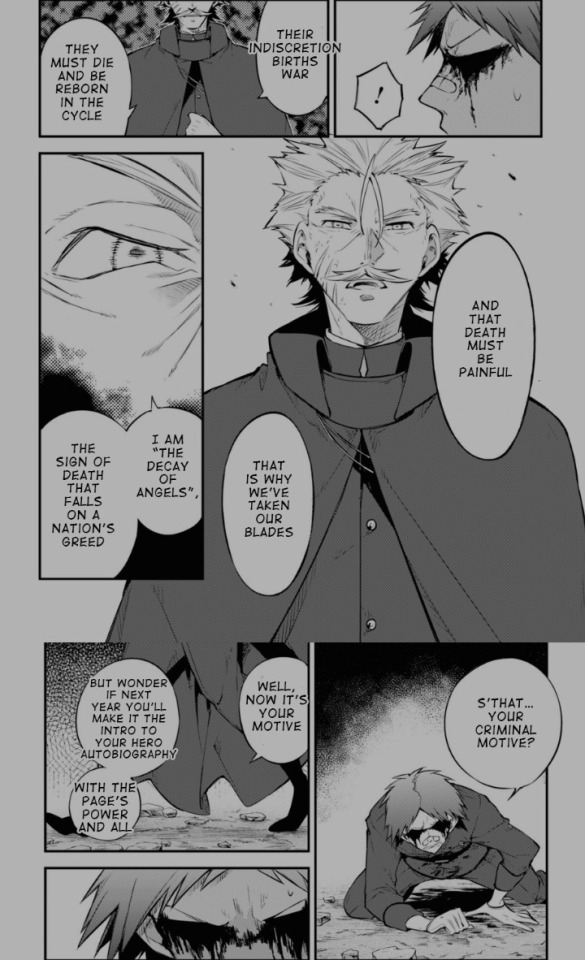
Some people view the concept of samsara optimistically, justifying it by saying that perhaps each individual is given a second (third, fourth, fifth, who knows) chance to refine their actions in order to be birthed into a better realm, with their karma being the independent variable.
On the other hand, other people, specifically the Hindus, view the cycle of existence as some sort of plague. To them, the flow of life and being forced to endure the suffering of mere existence in any form was somewhat frowned down upon. Some Hindus viewed samsara as a trap. Besides, having one's soul being limited to a physical body for the rest of eternity was not very appealing, especially since where they ended up at depended on the karmic value their past actions surmounted.
Even so, particular types of Buddhists don't seek nirvana, but instead, like the Hindus, they make an effort to be good people of society, building up their good deeds to increase the likelihood of being reborn into one of the better realms.
As mentioned before, the Deva Realm was the home of angels, the most carefree, gratified beings to exist. Fukuchi describes these angels as the people who don't get their hands dirty, the people who act as the puppeteers of society: politicians.
In terms of parallels, angels were the most fortunate and powerful, but they didn't have anyone ruling over them. A lack of supervision would lead to the abuse of power, which is what I believe Fukuchi was referring to. Deeming himself the Decay of Angels, he sought to prove himself as the 'sign of death that falls on the nation's greed.'
A few fun facts (okay, not really) about Yukio Mishima: he committed seppuku (ritual suicide by disembowelment) on the day he held a speech to voice out his unpopular political beliefs to the public. Mishima deeply treasured traditions and opposed the modern mindset the nation was advancing forward to adapt eventually. In his last book, The Decay of an Angel, he spoke about the five signs which complete the death of an angel:
Here are the five greater signs: the once-immaculate robes are soiled, the flowers in the flowery crown fade and fall, sweat pours from the armpits, a fetid stench envelops the body, the angel is no longer happy in its proper place.
The Decay of an Angel, p.53
The reviews about this series I've read so far describe Mishima's works to be quite complex; his writings demanded a lot of time to deconstruct and understand. They were highly symbolic, and he was pretty obsessed with death and the 'spiritual barrenness of the modern world.' I think you could attach a few strings from here to the mindsets of the DOA members. Of course, this parallel is completely abstract, but I'll go on rambling anyway:
He should have armed them with the foreknowledge that would keep them from flinging themselves after their destinies, take away their wings, keep them from soaring, make them march in step with the crowd. The world does not approve of flying. Wings are dangerous weapons. They invite self-destruction before they can be used. If he had brought Isao to terms with the fools, then he could have pretended that he knew nothing of wings.
The Decay of an Angel, p.113

I suppose you could resonate Nikolai with that excerpt. As much as Fukuchi takes the lead in this whole murder association, I'd like to believe that each member of the DOA plays an equally interesting part in whatever movement they're trying to execute. Fyodor feels it is his god-sent purpose to cleanse the world of its sins, his motto being, "Let the hand of God guide you." Sigma doesn't know where he belongs, since his origination comes from a page in the Book, and is fueled by the desperation to find a reason to live. Bram holds one of the most powerful abilities which is counted to be one of the "Top Ten Calamities to Destroy the World."
What I mean to say is that the DOA members are incredibly powerful, and they're not your ordinary antagonists (or I'm just biased). It's not just overthrowing authorities, mass genocide, and world domination— you could say that each individual is trying to utilize their purposes to their fullest expenditures, and the way they're trying to assert their plan into action is a little more passive-aggressive (framing the Agency, having a convo with a suicidal dude in jail, etc). They're the gray area between evil and good. As they framed the good guys for their own crimes, they're trying to conquer the bad guys for exploiting the innocent as they please.
This post would definitely age well if all hell breaks loose in the current arc (as if it didn't) and Kafka doesn't give us a happy ending.
That's all I have to say for now I guess! Thank you for reading, and once again, if anyone else something they wanna share, feel free to do so <3
sources (tryna follow Q's example ^_^) :
the six realms
samsara
the decay of angels
beast!au
the book
the sea of fertility
yukio mishima
theory: dazai’s emotional/mental state in beast!au
q’s theory: dazai being the protector of the book
theory: beast!dazai and the book
#my brain hurts#bsd#bsd characters#bsd analysis#bungo stray dogs#literature analysis#bsd dazai#bungou stray dogs#bsd beast#bsd manga#bsd spoilers#bsd fyodor#bsd fukuchi#bsd sigma#bsd nikolai gogol#bungo stray dogs wan#bsd decay of angels#bsd hunting dogs#bsd port mafia#bsd armed detective agency
216 notes
·
View notes
Note
Hi darling, Idk if you talked about this before, but what do you think about Rumeysa (Mustafa's concubine)? Do you think they planned to make her Mustafa's wife untill the actress was changed? And also, if she would've become his wife, how do you think she'd act in comparison to how Mihrunnisa (queen) acted? We didn't really see a lot of her but I wanted to know what do you believe they wanted to do with her character
Hey, dear! 🤗 No, I haven't talked about Rumeysa in here. I'll cover the S03 one and the S04 one separately, because in practice, they're both very different characters.
I strongly dislike S03 Rumeysa as a character, to be brutally honest. She goes all good, nice and innocent, when secretly she's sneaky and even manipulative in order to fulfill her goals. The thing that annoys me the most is not necessarily her fixation on Mustafa and how she wants to get him, because after all, it's a harem and everyone wants to get him, but how nearly inexplicable her whole motivation is, in spite and outside of that.
I feel Rumeysa's arc could be split in two almost separate halves - her set-up in the harem (pre-E93) and her as a favorite in the harem. (post-E93). The most interesting things about her were precisely her set-up and backstory. The way she was sent to the harem, the way she was tied to signora Gabriella, the way both of them were about to reunite and when that happened, Rumeysa was just confused more than anything... The idea of sisters finding each other within these harem walls was fascinating, but that was seemingly dropped. I feel even from this point on that the show tried to make a case of a person who's been long in the harem and has lost the touch of a free life to the point of being afraid to leave, but her confusion on the signora and her refusal to go with her was the only part they pulled off. (not to mention they executed that concept much better with Sümbül!) Then begins the second half of her arc that went in another direction the writers didn't succeed to make me get. I didn't get why she wanted Mustafa so much. She said she wanted and appreciated Mustafa a lot and that was why she wanted to leave and this trainwreck began all of a sudden! That doesn't make any sense! She had no (or at least not pivotal) scenes with Mustafa before E93, she neither experienced a desire to get Mustafa, nor was it shown to the audience in any way before the convenient moment. Her build-up was never about Mustafa before then. Her arc was never about Mustafa before then. And yet Mustafa became the center of her character, to the point it's as if they were like: "let's have another woman for Mustafa, but this time with an even more overexaggerated you might think it was Turhan Hürrem-esque arc, so we can make her his full on woman!". She was paving her way through sneaky methods to the point of hypocrisy for no reason, she didn't even have much of a threat, either. Ayşe Hatun put pressure on her once in a while, but it felt understandable when she had a child from Mustafa and that, Rumeysa started acting this confident just like that. I get that in the harem you have to be sorta like that in order to survive, etc., but with Rumeysa that wasn't enough of a motivation! She seemed just fine under Mahidevran and taking care of Nergisşah before then, she could calm people down, what happened? And notice how in the second part of her arc these scenes were lowered to the minimum, or recontextualized, at the very least, so you can't buy anything with her anymore.
But wait, what if she always wanted Mustafa when she arrived? Then every moment of kindness she has shown, even to the little child, becomes even worse in retrospect, because it would either just suit her interest, either become a jarring contrast with what she has shaped up to be. But wait actually, that effect is achieved even without her arc being split in two halves! I would've sympathized with her much more if there was some additional motivation, like everyone else basically, but honestly, the harem excuse is all we could use with her and in her case, that just doesn't suffice, especially for such a big shift in storylines. And then after building up to a halvet, we had the halvet and it was over and left me very unsatisfied. (okay, that's probably because of the actress, but still)
She was screwed up spectacularly at best and downright horrible at worst. Her early concept was way too good to be left out like that and since that leaving out was maybe inevitable for the writers, they had to do this transition better and have the first half of the arc be focused on Rumeysa, as well as Gabriella, instead of making this whole line with her being Gabriella's sister she was searching for more of a plot twist than an organic build-up, because Gabi was the one click baited to want Mustafa! This character ended up being defined by her goal she was trying to fulfill and nothing else, not any redeeming quality whatsoever.
I think Rumeysa was the least suited woman for Mustafa, yes, even less than Fatma. Because if Fatma had some love for him and was genuinely trying to calm him down after Efsun at first, with Rumeysa we simply had steps to get him right from the start and an entire ordeal that wouldn't sit well with Mustafa. We didn't even know not only why she wanted Mustafa, but also what was it she had with Mustafa - was it love, was he just a vessel for her to rise in the hierarchy (that's probably it for me), what was next when he was all hers etc. We have no feelings, no insight here and Mustafa himself was only slightly intrigued at best. And even if she were there for the battle of the throne, she would definetly scheme even more actively than anyone else and that would seriously clash with Mustafa's desires. I don't think she would suit S03B Mustafa's level of maturity, either.
Yes, I would say S03 Rumeysa could very well be the endgame for Mustafa and become his wife if it wasn't for the actress leaving and stuff, because of how she was framed to succeed. This part of Rumeysa's arc existed in a vacuum, it was a tiny victory after a tiny victory due to sly thinking that she was always allowed to get away with somehow. Again, the way she was slowly, but surely getting her way reminded me of all the Hürrem-esque arcs in the series that did end up with these women becoming the total favourites and I wouldn't be surprised at the least if they kept that pattern of success with Rumeysa, since it was very present in her arc.
[While we're at it, I didn't get why Mahidevran believed her so much. On one hand, yes, character development, because, as seen with Mihrünnisa later, as well, Mahidevran no longer gets suspicious of the nature of these women and only intervenes when she sees a decision of Mustafa's regarding them that could potentially be dangerous for his future, coupled with the fact that Mahidevran values loyalty a lot and she has seen nothing but that with Rumeysa. But on the other hand... Mahi is usually so perceptive when it comes to women that could actually be problematic or dangerous for him and Rumeysa being the only exception then was as much character development and the chance of lowering her guard because of the calmer environment as it was.. way too convenient, since we saw Rumeysa was playing a game behind the curtain. Especially the situation when Rumeysa provoked Ayşe Hatun on purpose for Mahi and Musti to see and Mahi not listening to Ayşe or Fidan's warnings about Rumeysa, along with her fully adapting to the harem laws she was previously against and taking on her role as a Valide in Mustafa's harem, was almost like Plot Armor for Rumi similarly to how Hürrem acted accordingly when she saw SS listening to her in the candle mirror in E44, albeit in the opposite way. I view that as a clear recipe for narrative favor and I was appalled that it had to be with such a character.]
If S03 Rumeysa became his wife, I don't see her acting much like Mihrunnisa. First off, due to how her arc was framed, Ayşe Hatun would have very much stayed as an antagonist of hers (even though Rumi wouldn't view her as one in their confrontations) and would try to eliminate her in a secret, subtle and cunning way. While Rumeysa would definetly try her all to keep Mustafa safe and would try to win Mahidevran's support for the marriage the way Mihrunnisa did, Rumi would have more of an agenda of her own she would follow. I won't be surprised if she tried head down on the path to overpower them all in her influence of him, either. Mustafa and Mihrunnisa were partners more than anything, with the same ideals, aspirations and desires. They were very close in their way of thinking and how they would approach problems, that's why they had such a deep bond. S03 Rumeysa would get further and further away from Mustafa's personality as his wife and if the other S04 events are canon, she would probably indeed go and reveal Bayezid's marriage with Huricihan the moment Mustafa refused to and act herself instead.
S04 Rumeysa is barely there, but I like her a bit better. She is an entirely different character with her consistent worries for the future, her more caring and protecting nature and even Mahidevran's more "I'm fed up with all this" attitude to her. Even if we add S03 Rumeysa to the mix, we get at least more feeling out of her and what was she all about and we get some other contrasting facets of hers as a bonus: in contrast to Rumi calming Mahidevran down when Mustafa disobeyed SS's order in E91/2 (my favourite S03 Rumeysa scene, but it was also kinda ruined post-E93), now Mahidevran tells her not to worry so much. Thing is, S04 Rumeysa could very well work without S03 Rumeysa both because of the different actress and the different characterization that could only loosely recontextualize S03 Rumeysa at best, and since there was a time skip, some random concubine and favourite Mustafa slept with and she became pregnant wouldn't be out of the question at all. Yes, her death would probably have less impact that way, but nor could I ever bother with S03 Rumeysa, nor would it be weird because of her different dynamics, which made her look almost foreign in comparison. (that's not on the actress, both Rumeysas were great!) And it would be as impactful as it would've been for Mustafa and Mahidevran, because the loss of the child would be just as devastating for him and was still tied to the mirror of sin.
If S04 Rumeysa didn't die and became Mustafa's wife, I think their bond would be focused more on their future child than anything. Rumeysa would probably act similarly to S03 Ayşe Hatun, only in a more secure position, I see a lot of similarities there. I don't think their bond would be as deep, but they could have the chance to get close for a little bit. I see Rumeysa refraining from acting so much, because of her worrying for the consequences, but when that fear gets the best of her, she could take desperate measures.
#magnificent century#muhteşem yüzyıl#muhtesem yuzyil#rumeysa hatun#ask#queen-deter#that's basically why S03 Rumeysa annoys me so much#actually strongly disliking her is an understatement#i may overexagerrate but she indeed is one of my least favourite characters in the show#the interesting thing is that Firuze had similar problems with her ambiguity#but not only is she an antagonist rather than one we're supposed to root for in narrative#we see her helping nature outside of her plan which helps us buy it much more and actually be a more functional contrast#unlike rumeysa#and while she was written in two halves as well i'll probably call them pre-plan of twist and post-plan of twist#the build up was slower and more detailed since it was framed as a mistery we weren't supposed to buy#so her motivations were more interesting to decipher#and she had a personality outside of the schemes that could work outside of the planning issues#rumi is more like Turhan in comparison#a much softer version ofc but still
19 notes
·
View notes
Text
The Roku/Sozin ancestry plot twist for Zuko
Like I’m sure this has been said before but the twist about Zuko being a descendant of both Roku and Sozin is actually a disservice to his character and his narrative as well? The way the narrative frames this reveal along with Iroh's dialogue, it backtracks on a lot of the story we are shown in Book 1&2 (and sometimes it even clashes with some dialogues in Book 3).
Iroh: “Because understanding the struggle between your two great-grandfathers can help you better understand the battle within yourself. Evil and good are always at war inside you, Zuko. It is your nature, your legacy. But, there is a bright side. What happened generations ago can be resolved now, by you. Because of your legacy, you alone can cleanse the sins of our family and the Fire Nation. Born in you, along with all the strife, is the power to restore balance to the world.”
1. This implies that there are equal amounts of good and evil in Zuko and his internal struggle is about choosing one of them.
The core qualities of Zuko as a character are empathy, compassion and kindness. A person who always gets upset when he sees or even thinks about other people in pain, a person who spoke out against powerful people to save lives that were being sacrificed needlessly, a person who shows mercy to people who don’t deserve it, a person who is willing to reach out a hand to save the life of the man who tried to kill him, a person who avoids fights when possible, a person who is willing to fight on behalf of a family he has known for only one night, a person who reaches out to sympathise after being yelled at— a person like this is definitely not struggling with equal parts of good and evil within them.
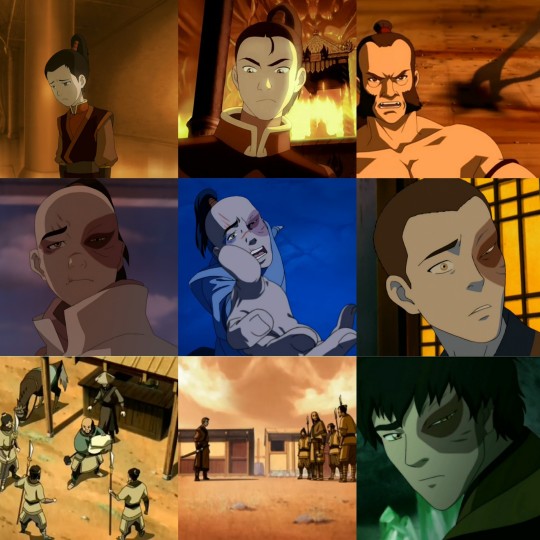
Zuko does have two selves, but they can be categorised as pre-scar and post-scar.
His pre-scar version is the version who was unabashedly kind and compassionate, who spoke his mind without thinking of consequences. But his post-scar version was a cover up of the pre-scar version. It was a lie that Zuko lived everyday. He convinced himself that this was how he had to be; because this was what Ozai wanted him to be and that there was no other way.
And yet, when the situation is dire and he is depending on his instincts or when he is given a free choice, we see the pre-scar Zuko spring into action. Because that’s who he really is. It’s not a struggle between good and evil within him, it is his supressed self making an appearance when he slips up and fails to maintain his facade.
Perhaps the line that describes his internal struggle the best is this:
Zuko, imitating Iroh: Zuko, you have to look within yourself to save yourself from your other self. Only then will your true self, reveal itself.
And while this dialogue was played for laughs, it is the most accurate description of how Zuko had to reach for his suppressed self, his real self, to save himself from becoming what Ozai wanted him to be.
2. It also implies that Ozai and Ursa had equal influence on Zuko's upbringing and that he struggled to chose between what was taught to him by Ursa (good) and Ozai (evil).
The idea that Zuko has equal amounts of good and evil inside himself goes hand in hand with idea that the good and evil traits in him have been passed onto him by Ursa and Ozai's upbringings respectively which are legacies of Roku and Sozin.
I don’t need to look any further than “Zuko Alone” to know that Ozai's impact on Zuko's upbringing was slim to none. The flashbacks that we see, are dominated by Ursa's presence. Ozai hardly gets any time onscreen. And when he does, he is shown as a silhouette and when he isn’t a silhouette, we only see him smile at Azula's display of skills and frown at Zuko's attempt.
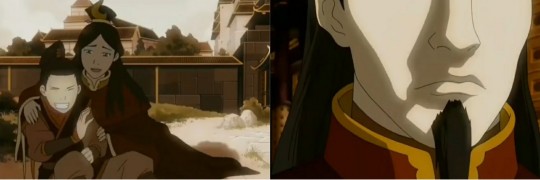
Ozai was Zuko's father alright, but never in the ways that mattered. We know that Ozai abused Zuko. He constantly belittled him and compared him to Azula. Partially because Zuko lacked the natural talent that Azula had and partially because he lacked the ruthlessness and cruelty that Azula displayed even at her age.
Which made Zuko copy Azula's behaviour to get his father’s acceptance. But whenever Ursa noticed this, she immediately corrected Zuko and clearly told him that it was wrong.
Ozai is never shown to tell Zuko that whatever Ursa told him was wrong. Ozai personally never taught him anything (except that one time). He appreciated Azula's behaviour and encouraged her to keep it up but he just kept on expressing his disappointment in Zuko.
Ursa: Remember this, Zuko. No matter how things may seem to change, never forget who you are.
Zuko's innate kindness and compassion were protected by Ursa in the formative years when he was at his most pliable. And this is why no matter what happens, he never loses these qualities and is able to retain his real self even after he tried hard to suppress it.
3. It diminishes the extent of psychological damage and trauma caused by the scarring incident.
The one time Ozai did take it upon himself to teach something to Zuko:
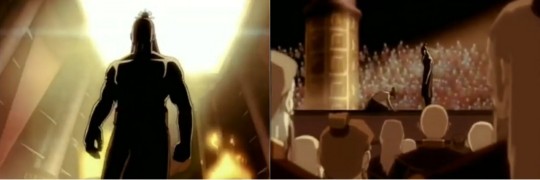
Ozai: You will learn respect, and suffering will be your teacher.
(Notice that here too Ozai's form is silhouetted against the light behind him.)
The scar is so much more than just a scar to Zuko. It is the one lesson that Ozai taught him. The scar exists because of Zuko's innate compassion. It was put on his face in an attempt to burn out his compassion. It was put there to be a constant reminder of what would happen if he dared to do something that went against what Ozai wanted from him. The scar was Ozai’s brand on his face. It took away Zuko's autonomy to make decisions for himself. It was a constant reminder that Zuko’s opinions didn’t matter.
Post-scar Zuko is Zuko's attempt at supressing his real persona to become the person Ozai wanted him to be, because he learned the hard way that he didn’t have the choice to be anyone else.
In fact, the first time Zuko makes a deliberate choice to go against what was expected of him, (letting Appa go) he succumbed to a fever. His emotional turmoil of coming to terms with the fact that he didn’t need to listen to Ozai and abide by him; a notion that he had been force feeding himself, everyday, for the last three years, manifested itself physically in the form of a fever. That was how deep the psychological damage caused by the scar was. (I hate it when people call it an angst coma.)
Saying that Zuko was struggling with equal amounts of good and evil within him, oversimplifies the complex emotional trajectory he had about coming to terms with the abuse he went through and reclaiming his autonomy and his personal opinions and beliefs, into just a choice between two aspects of his personality.
Zuko: I wanted to speak out against this horrifying plan, but I'm ashamed to say I didn't. My whole life, I struggled to gain my father's love and acceptance, but once I had it, I realized I'd lost myself getting there. I'd forgotten who I was.
4. This implies that Zuko's destiny was pre-determined.
Iroh said in the dialogue that Zuko was born with the power to restore balance in the world and that only he could do it.
Zuko, the character who has always had to struggle to gain what he wanted is suddenly told of an advantage that he had just by the virtue of birth? Kinda defeats the purpose of: "Azula was born lucky; I was lucky to be born", if you ask me.
And even more importantly, he let go of the destiny that Ozai forced on him, only to take on another predetermined destiny; a destiny that was his to fulfil by the virtue of birth, and took steps to fulfil this other destiny, instead of making a destiny of his own and paving his own path to it by making the choices that he had been denied for so long because of Ozai. Which seems weird because all the other times Iroh talks to Zuko about this topic, he always emphasises on how it’s Zuko's choice to make his own destiny:
Lake Laogai:
Zuko: I want my destiny.
Iroh: What that means is up to you.
Lake Laogai:
Zuko: I know my own destiny, Uncle!
Iroh: Is it your own destiny, or is it a destiny someone else has tried to force on you?
Zuko: Stop it, Uncle! I have to do this!
Iroh: I'm begging you, Prince Zuko! It's time for you to look inward and begin asking yourself the big questions. Who are you, and what do you want?
Crossroads of Destiny:
Iroh: Zuko, I am begging you. Look into your heart and see what it is that you truly want.
Western Air Temple:
Iroh: You know Prince Zuko, destiny is a funny thing. You never know how things are going to work out. But if you keep an open mind, and an open heart, I promise you will find your own destiny someday.
5. It indirectly implies that the good™ in Ursa and Zuko exists because they are a part of the Avatar's legacy.
Making Ursa a daughter of a nobleman (as intended originally)* would’ve served a much better purpose for the message that the episode was trying to get across: “the Fire Nation isn’t inherently evil”.
Katara: You mean, after all Roku and Sozin went through together, even after Roku showed him mercy, Sozin betrayed him like that?
Toph: It's like these people are born bad.
Aang: Roku was just as much Fire Nation as Sozin was, right? If anything, their story proves anyone's capable of great good and great evil. Everyone, even the Fire Lord and the Fire Nation have to be treated like they're worth giving a chance.
Had Ursa not been Roku’s descendant, then there would've been people other than just Roku and his descendants, who were Fire Nation and good™. (Iroh is literally the only exception.)
Moreover, Azula is just as much a part of “Roku’s legacy” as Zuko is, and yet is completely overlooked when it comes to it. She isn’t shown to be struggling with equal amounts of good and evil. She isn’t gifted at birth with the capacity to bring balance back to the world. It appears as if she had inherited only “Sozin's legacy”.
So, not only does this Roku/Sozin twist go against Zuko's fundamental characterisation, but it also partially deconstructs the narrative that had been carefully set up for him over the course of 2 seasons.
*(I have been looking relentlessly for the post where I saw two screen caps of the two different characterisations of Ursa: 1. Ursa as we see her in "Zuko Alone"; 2. Ursa as Roku's descendant. And I can't find it now otherwise I would've linked it.)
#i saw a vid on atla's official yt abt zuko#and the way his entire narrative was shown to be hinged on#being roku and sozin's descendant#it pissed me off; so here's the rant#zuko#zuko meta#prince zuko#atla zuko#atla#atla meta#ozai#lady ursa#azula#roku#sozin#avatar#avatar the last airbender#ira's posts
218 notes
·
View notes
Note
I dont think the ending of Promising Young Woman is copaganda. I think if it was, the cops would've found Cassie on their own, and the detective would've noticed how Ryan was acting guilty.
But they didn't. Cassie had to had them information via the lawyer. And its shown that the detective was eager to rule that Cassie was suicidal. It shows how it took Cassie getting murdered for anything to happen.
Also, it wasn't Emerald Fennells original ending, she had to change it for the producers
This got super long. Spoilers below obviously
I agree that the film shows pretty clearly that cops getting involved does not equal justice, and the justice system itself is not made to serve Cassie. The film shows the justice system kicking into gear when Cassie forces its hand. It’s not as though rapists never get convicted; they do, when they’re unlucky. But Cassie manages to get her marks arrested in the end, and I think the issue people have with this moment is how it allows the cops to justify their authority. A “when the cops work, they work” kind of sentiment.
I think it’s fair to be skeptical about cops as a deus ex machina, swooping in to lock up the bad guys. PYW doesn’t resolve its cop problem, in that we don’t know what their presence means for the characters. But I would argue that the cops don’t represent resolution at all - they represent the start of another narrative that happens within the realm of the state, the justice system. Cassie ends the film, because Cassie’s narrative is what matters to the film.
Honestly, it’s a much denser ending than lots of ppl have made it out to be, even people who liked the film overall. If you’re interpreting the film uncharitably, you could say that it concludes that cops=justice. But idk, to me, the cops ending the movie means that Cassie’s story is no longer hers - it will have a public afterlife that she can’t control. The cops represent the entrance of the state, and maybe that inspires relief in people who have faith in the state. But the text & the wink, imo, undermines that relief. Because what the hell really happened here? The bad men might go the jail, but has anything been fixed? Healed? Has anything fundamentally changed? Cassie may have gotten what she’s been fighting for, but it’s a small individual victory that comes at an expense that’s hard to rationalize. I don’t think Fennell wants us to celebrate this outcome, but it’s definitely a complicated note to end on.
My problem is that people have pointed out how unsatisfying this ending is as a critique of PYW, when in my opinion it’s an obvious strength. Like, if you don’t feel relief when the cops swoop in, if you feel tense and skeptical, I think that’s something PYW wants to evoke. Again, the issue here is that people wanted something from the film that it was never going to give. If you’re reading the film as a revenge success story or feminist manifesto, this ending feels hollow. I responded by adjusting my reading of PYW, but some people conclude it was a failed take on the rape-revenge thriller. And yeah, ultimately I think they’re wrong, because by the end, I think it’s pretty clear that Cassie is a tragic figure, not a ~girlboss role model~. It's not wish fulfillment, it’s a tragic catharsis. I want to discuss the ending on its own terms & examine how the film portrays cops, but if we’re starting from the assumption that PYW is a success story, it’s kind of hard to have that discussion.
TLDR; The movie has cops in it, but imo it’s more interesting to talk about what that means than immediately dismiss it.
Also, I’m really curious about what you said about the original ending. I couldn’t find that information myself, so feel free to send the source if you have access to it. I remember reading that Fennell considered a happier ending but ruled it out early on. I don’t think this info would impact my reading of the movie, but it’s interesting that the producers preferred this ending. I didn’t think cassie’s death was a super audience friendly moment, haha.
#ask#thank u so much for engaging!!#sorry for the length lol#promising young woman#sa cw#pyw#emerald fennell
15 notes
·
View notes
Note
I would've preferred playing as Charles in the epilogue. Even burying Arthur, sad and...icky as that'd be. Love their friendship. Arthur was so perfectly comfortable and trusting toward Charles who provides emotional support when no one else did. They even both tear up over Eagle Flies! Overall, I didn't like his character arc's conclusion. Charles struck me as more Arthur's bestie than John's. I would have preferred seeing him helping Rains Falls' tribe. I also want more of his backstory.
OK, I’m gonna have to argue strongly with your assertion that nobody else provided emotional support to Arthur. I’m a little irritated seeing this Only Charles cared about Arthur! assertion bandied around fandom over and over. Because Sadie sure as hell did too. She very much went out of her way to support him, repeatedly puts herself forward to protect him and to try to take some of the burden from him, and strove to make certain the people he held dearest to him were safe and his goals were accomplished. And I’m a little irritated that Sadie’s efforts keep getting dismissed, because it feels a lot like the dismissive assumption that as a woman what Sadie does is nothing special because it’s societal expectation for a woman to go out of her way to help a man, whereas when Charles, as a man, does it, it’s considered remarkable and praiseworthy.And that’s not me speaking as a Sadithur shipper, or even a Sadie fan. That’s me as a woman being really Goddamn tired of the intrinsic sexism in the standards we apply to characters and their relationships, across fandoms. Let’s be better, please.Off my soapbox, I agree with you about Charles and Arthur having a strong brotherhood that I very much enjoy. I think Charles was poorly served by the Epilogue as written, to be honest. The whole “he buried Arthur” is lovely and touching and I believe Charles would do it. But I’m struggling with the nuts and bolts of that sequence. He was out of touch with the gang and didn’t know where everything went down, and on what night. He was already up in Canada and heard about it and somehow knew exactly where to find Arthur’s decomposing corpse probably weeks (at least) later? The logic seems a bit weird. The logic of everything for Charles in the Epilogue seems off, and it bothers me, because I feel like plot drove character there, not the other way around, which is as it should be. I do believe Charles would have gone after Micah out of love for a brother, and fulfilling Arthur’s last wishes. He even says as much on the ride to Mt. Hagen–it’s not about revenge for him, he’s doing it for Arthur. But at the end of Chapter 6 it seems like a satisfying ending for him. He’s found his home with the Wapiti, this poor dude who’s never felt like he’s belonged anywhere.And then we find in the Epilogue that’s not true, with no explanation. Something made him leave the Wapiti, and roam alone again, and end up prize fighting to earn enough to survive. And then suddenly after Mt. Hagen he’s…gung-ho to go right on back to Canada and the Wapiti and get married, like nothing happened to make him leave that life?I’m not saying those datapoints can’t all connect in some kind of cogent narrative of Charles’ intervening years, but Rockstar really didn’t put in the work there, IMO. It feels like they just carelessly yoinked him from his HEA in Canada to have a strong dude available to help build Beecher’s Hope, then have him go to help fulfill Arthur’s wish to go after Micah, and then immediately nerf him the moment they get to Mt. Hagen with an injury so he doesn’t straight up shoot Micah in the face and make that showdown really short (and they severely injure Sadie for the same reason). Sadie stumbles up the mountain half-disemboweled to get the job done but Charles just kinda…sits this one out with an arm wound for unexplained reasons? It takes away a badass moment that he too deserved. I feel like Charles was pretty poorly served by the Epilogue, not gonna lie. He doesn’t get his established narrative as joining the Wapiti respected, and he doesn’t even really get to contribute to giving Arthur’s spirit peace, so what was the point of disrupting his life like that without any explanation as to how or why? I think there was a way Charles could have been involved in the Epilogue and been better respected as a char, but it didn’t go that way. As for wanting to see him helping the tribe, I’m with you on that. Chapter XI of Sunrise definitely will have Charles, since Arthur and Sadie will be going north to Canada to visit him, Rains Fall, and the rest of the Wapiti. And while I’m sticking to Arthur and Sadie POV, I’ll definitely try to get more of Charles’ backstory in there if I can!
19 notes
·
View notes